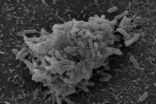(Press-News.org) Queen's University researcher Richard Oko and his co-investigators have come up with a promising method of treating male infertility using a synthetic version of the sperm-originated protein known as PAWP.
They found this protein is sufficient and required to initiate the fertilization process.
Dr. Oko's research promises to diagnose and treat cases of male factor infertility where a patient's sperm is unable to initiate or induce activation of the egg to form an early embryo.
"PAWP is able to induce embryo development in human eggs in a fashion similar to the natural triggering of embryo development by the sperm cell during fertilization," explains Dr. Oko (Biomedical and Molecular Sciences). "Based on our findings, we envision that physicians will be able to improve their diagnosis and treatment of infertility, a problem that affects 10 to 15 per cent of couples worldwide."
The results of this study highlight the potential clinical applications of sperm PAWP as a predictor of infertility treatment. Since most human infertility treatments are now done by injecting a single sperm directly into an egg, supplementation of human sperm with PAWP protein may potentially be used to improve the success rate of infertility treatments in the future.
According to the Centers for Disease Control and Prevention's 2013 Annual Report on Assisted Reproductive Technologies, only about 37 per cent of treatment cycles lead to successful pregnancy. This low success rate may be due to a variety of factors in the male and female including the inability of sperm cell to initiate fertilization and trigger embryo development upon egg entry.
"The results of our study set the stage for further investigation of PAWP protein as a molecular marker for diagnosis and as a factor for improvement of infertility treatments," says Dr. Oko.
Dr. Oko worked with his former PhD student Mahmoud Aarabi and Clifford Librach and Hanna Balakier at the CReATe Fertility Centre in Toronto on this latest research, which was published in the FASEB Journal, the world's most cited biology journal.
INFORMATION:
Fertile discovery
A synthetic protein could improve the diagnoses and treatment of male infertility
2014-08-11
ELSE PRESS RELEASES FROM THIS DATE:
Penn-led expert panel calls for public health research on natural gas drilling
2014-08-11
PHILADELPHIA – Groundwater and air quality testing before, during, and after natural gas drilling – which includes hydraulic fracturing -- should be key components of efforts to ensure the safety of communities near these sites, according to an expert panel convened to weigh in on public health research needs associated with unconventional natural gas drilling operations (UNGDO). The panel also urges that any research conducted should use "community-based participatory research principles" so that the concerns of the many stakeholders involved in these activities can be ...
Rutgers researchers show that how fast you drive might reveal exactly where you are going
2014-08-11
In our constantly connected, information-rich society, some drivers are jumping at the chance to let auto insurance companies monitor their driving habits in return for a handsome discount on their premiums.
What these drivers may not know is that they could be revealing where they are driving, a privacy boundary that many would not consent to cross.
A team of Rutgers University computer engineers has shown that even without a GPS device or other location-sensing technology, a driver could reveal where he or she traveled with no more information than a starting location ...
School violence, gun-related injury among top 10 child health concerns nationally
2014-08-11
ANN ARBOR, Mich. – Childhood obesity remains the top health concern for children in 2014, but when asked about national concerns, adults put school violence and gun-related injuries in the top 10, according to a new University of Michigan C.S. Mott Children's Hospital National Poll on Children's Health.
In the poll's annual top 10 list, a nationwide sample of adults were asked to identify the biggest health concerns for kids in their communities, as well as kids nationwide. Overall, childhood obesity is rated at the top of both lists: 29 percent of adults said obesity ...
Inequality -- a key issue of economic research
2014-08-11
In the aftermath of the global financial crisis and the ensuing economic and political disruptions, inequality has re-emerged as a central focus of public debate. The drivers of rising inequality of income and wealth and the various scientific models for counteractive measures will be among the central topics debated among 17 Nobel Laureates in Economic Sciences and approximately 450 aspiring young economists from more than 80 countries in Lindau, Germany, next week. The 5th Lindau Meeting on Economic Sciences will bring them together for a unique dialogue across generations, ...
Clues emerge to genetic architecture of cognitive abilities in children
2014-08-11
How genes affect intelligence is complicated. Multiple genes, many yet unknown, are thought to interact among themselves and with environmental factors to influence the diverse abilities involved in intelligence.
A large new genetic study in thousands of children and adolescents offers early glimpses of the overall patterns and connections among cognitive abilities such as language reasoning, reading skill and types of memory. The findings may lead to new tools in understanding human cognitive development and neuropsychiatric disorders.
"This research is one of the ...
More intensive interventions needed to combat severe obesity in teens
2014-08-11
New Rochelle, NY, August 11, 2014 -- Nearly 6% of all children and teens in the U.S. are severely obese, and the prevalence of severe obesity is increasing faster than that of moderate obesity or overweight. This is an alarming trend as about 90% of these youths will grow up to be obese adults. The serious health problems associated with severe obesity and the poor long-term prognosis and quality of life projected for these children and teens demand more serious consideration of safe and effective treatment options that go beyond diet and lifestyle modifications, as proposed ...
Pairing old technologies with new for next-generation electronic devices
2014-08-11
UCL scientists have discovered a new method to efficiently generate and control currents based on the magnetic nature of electrons in semi-conducting materials, offering a radical way to develop a new generation of electronic devices.
One promising approach to developing new technologies is to exploit the electron's tiny magnetic moment, or 'spin'. Electrons have two properties – charge and spin – and although current technologies use charge, it is thought that spin-based technologies have the potential to outperform the 'charge'-based technology of semiconductors for ...
Sugary bugs subvert antibodies
2014-08-11
A lung-damaging bacterium turns the body's antibody response in its favor, according to a study published in The Journal of Experimental Medicine.
Pathogenic bacteria are normally destroyed by antibodies, immune proteins that coat the outer surface of the bug, laying a foundation for the deposition of pore-forming "complement" proteins that poke lethal holes in the bacterial membrane. But despite having plenty of antibodies and complement proteins in their bloodstream, some people can't fight off infections with the respiratory bacterium Pseudomonas aeruginosa. And chronic ...
Tackling liver injury
2014-08-11
A new drug spurs liver regeneration after surgery, according to a paper published in The Journal of Experimental Medicine.
Liver cancer often results in a loss of blood flow and thus oxygen and nutrients to the liver tissue, resulting in deteriorating liver function. Although the diseased part of the liver can often be surgically removed, the sudden restoration of blood flow to the remaining liver tissue can trigger inflammation—a process known as ischemia reperfusion injury (IRI). IRI results in part from the deposition of immune proteins called complement on the surface ...
'Seeing' through virtual touch is believing
2014-08-11
Visual impairment comes in many forms, and it's on the rise in America.
A University of Cincinnati experiment aimed at this diverse and growing population could spark development of advanced tools to help all the aging baby boomers, injured veterans, diabetics and white-cane-wielding pedestrians navigate the blurred edges of everyday life.
These tools could be based on a device called the Enactive Torch, which looks like a combination between a TV remote and Captain Kirk's weapon of choice. But it can do much greater things than change channels or stun aliens.
Luis ...
LAST 30 PRESS RELEASES:
Justice after trauma? Race, red tape keep sexual assault victims from compensation
Columbia researchers awarded ARPA-H funding to speed diagnosis of lymphatic disorders
James R. Downing, MD, to step down as president and CEO of St. Jude Children’s Research Hospital in late 2026
A remote-controlled CAR-T for safer immunotherapy
UT College of Veterinary Medicine dean elected Fellow of the American Academy of Microbiology
AERA selects 34 exemplary scholars as 2026 Fellows
Similar kinases play distinct roles in the brain
New research takes first step toward advance warnings of space weather
Scientists unlock a massive new ‘color palette’ for biomedical research by synthesizing non-natural amino acids
Brain cells drive endurance gains after exercise
Same-day hospital discharge is safe in selected patients after TAVI
Why do people living at high altitudes have better glucose control? The answer was in plain sight
Red blood cells soak up sugar at high altitude, protecting against diabetes
A new electrolyte points to stronger, safer batteries
Environment: Atmospheric pollution directly linked to rocket re-entry
Targeted radiation therapy improves quality of life outcomes for patients with multiple brain metastases
Cardiovascular events in women with prior cervical high-grade squamous intraepithelial lesion
Transplantation and employment earnings in kidney transplant recipients
Brain organoids can be trained to solve a goal-directed task
Treatment can protect extremely premature babies from lung disease
Roberto Morandotti wins prestigious Max Born Award for pioneering research in quantum photonics
Scientists map brain's blood pressure control center
Acute coronary events registry provides insights into sex-specific differences
Bar-Ilan University and NVIDIA researchers improve AI’s ability to understand spatial instructions
New single-cell transcriptomic clock reveals intrinsic and systemic T cell aging in COVID-19 and HIV
Smaller fish and changing food webs – even where species numbers stay the same
Missed opportunity to protect pregnant women and newborns: Study shows low vaccination rates among expectant mothers in Norway against COVID-19 and influenza
Emotional memory region of aged brain is sensitive to processed foods
Neighborhood factors may lead to increased COPD-related emergency department visits, hospitalizations
Food insecurity impacts employees’ productivity
[Press-News.org] Fertile discoveryA synthetic protein could improve the diagnoses and treatment of male infertility




